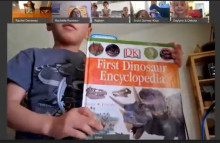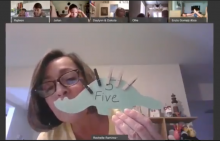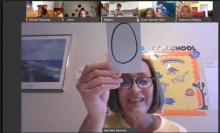 Students engaged with others by individually sharing like they would during an in-person class.
MESA, Arizona -- Aug. 20, 2020 -- The Mesa Community College Evelyn H. Warren Child Development Lab (CDL) sets a new standard in virtual early childhood teaching and learning.
Students engaged with others by individually sharing like they would during an in-person class.
MESA, Arizona -- Aug. 20, 2020 -- The Mesa Community College Evelyn H. Warren Child Development Lab (CDL) sets a new standard in virtual early childhood teaching and learning.
The lab school is an accredited program through the National Association for the Education of Young Children. Providing enriching, developmentally-appropriate activities for young children, toddlers and preschoolers, the CDL simultaneously serves as a training environment for MCC early childhood education interns. When education began to shift online in spring 2020, the CDL team quickly adapted to virtual learning.
With the onset of the pandemic, Rochelle Ramirez-Clark, CDL supervisor and lead teacher, embraced technology as a tool for a meaningful education experience for young children and their families.
“The mindset for the program was not to replace the value of a face-to-face experience, but rather to provide an enriching experience for the children and fill a need for the families and interns,” said Ramirez-Clark. “We wanted to create a welcoming, fun and engaging experience for the children.”
Dawn Wilkinson, MCC faculty serving as the coordinator for the early childhood program, provided the technical guidance and support needed for the success of the summer virtual programs. While  Rochelle Ramirez-Clark, CDL supervisor and lead teacher, adapted learning plans and activities to engage young children remotely.
Ramirez-Clark focused on developing learning plans and activities for the young children and interns, Wilkinson focused on training and providing support in the technical arena.
Rochelle Ramirez-Clark, CDL supervisor and lead teacher, adapted learning plans and activities to engage young children remotely.
Ramirez-Clark focused on developing learning plans and activities for the young children and interns, Wilkinson focused on training and providing support in the technical arena.
“Just as we would encourage young children to play with new items, we as adults had to play with the platforms and programs that we would be using,” Wilkinson said. “In a safe environment among colleagues, we gave ourselves time to press buttons to see what would happen and took turns being the presenter. This time truly gave us the confidence to launch this new virtual program with the families.”
The overwhelming success of the virtual spring classes led to the development of eight-week virtual parent-toddler and preschool programs over the summer.
Matt Rayman, a father of twin girls who attended the summer toddler program, said, “They have never done anything like this before and I have been so proud with how engaged they are with the content. The program has shown me that it is time to start learning some things that I didn’t know they were ready for yet, like using utensils and learning some new dance moves.”
The interns experienced a seamless learning experience as well.
“Overall, the internship exceeded my expectations. I learned a lot about early childhood education and had the opportunity to teach sessions,” said early childhood intern Lyn Coulthard. “I was surprised at how engaged the younger students were, and I was curious to observe them and watch how the teacher engaged with them and held their attention.” Students learned letters of the alphabet by recognizing the first letter of each other’s names.
Students learned letters of the alphabet by recognizing the first letter of each other’s names.
“We were ecstatic with the progress our young children made with the virtual program during the spring and summer sessions,” said Faculty & Program Director of the MCC Early Childhood Education Program Annapurna Ganesh. “The word got out, our colleagues from higher education and center directors in the Valley asked us to share how we adapted to the virtual environment.
There were more than 50 participants in our virtual how-to meeting and many others who have reached out. I am incredibly proud of the MCC early childhood education team, the go-getter attitudes of the interns and the adaptations they made to make sure each of the young children was personally recognized, praised and engaged during each virtual class session.”
The tremendous success of the summer program paved the way for the MCC Child Development Lab to offer virtual enrichment programs for Fall 2020. From September to November, three themed, four-week sessions are available for children 18 months to 5 years old. Visit mesacc.edu to learn more about the college’s virtual early childhood enrichment programs.
# # #
Media contact: Dawn Zimmer, dawn.zimmer@mesacc.edu or 480-461-7892
The MCC Evelyn H. Warren Child Development Laboratory is a multi-age preschool that is accredited by the National Association for the Education of Young Children (NAEYC). The laboratory programs provide opportunities for students in MCC classes to observe and interact with young children and their families in a developmentally appropriate environment.The program is designed for children to participate in activities to enhance and develop social and verbal skills, problem solving abilities, large and small motor coordination, cognitive concepts and practical life experiences. Parent involvement in the lab is encouraged. Learn more at mesacc.edu/departments/education-studies/child-development-lab.
Mesa Community College is nationally recognized as an Aspen Prize Top 150 U.S. Community College and is known for service learning, career and technical programs, civic engagement and innovative approaches to education. The college has served as a resource for career readiness, transfer education, workforce development and lifelong learning throughout its 50-year history. Host to more than 30,000 students annually, MCC offers degree and certificate programs online, and at its two campuses and additional locations. Through Guided Pathways with Integrated Support Services, MCC is transforming the ways it champions student success, college completion, university transfer and career attainment or advancement. MCC is a Hispanic Serving Institution and more than 50% of its students are the first in their family to attend college. Its American Indian Institute serves 22 federally recognized Arizona tribes and more than 30 out-of-state tribes. The diverse student body includes more than 400 international students representing over 60 countries. Award-winning faculty are dedicated to student success, providing the education and training that empowers MCC students to successfully compete in the workforce. Located in the East Valley of Phoenix, Arizona, MCC is one of 10 colleges in the Maricopa County Community College District. Visit mesacc.edu to learn more.
Mesa Community College is accredited by the Higher Learning Commission (HLC).
The Maricopa County Community College District (MCCCD) is an EEO/AA institution and an equal opportunity employer of protected veterans and individuals with disabilities. All qualified applicants will receive consideration for employment without regard to race, color, religion, sex, sexual orientation, gender identity, age, or national origin. A lack of English language skills will not be a barrier to admission and participation in the career and technical education programs of the District. MCCCD does not discriminate on the basis of race, color, national origin, sex, disability or age in its programs or activities. For Title IX/504 concerns, call the following number to reach the appointed coordinator: (480) 731-8499. For additional information, as well as a listing of all coordinators within the Maricopa College system, visit www.maricopa.edu/non-discrimination.

